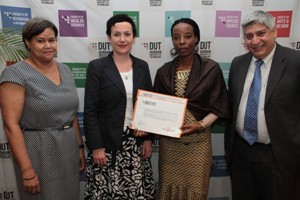The Durban University of Technology joined in on the global drive for free accessibility of research and all scientific knowledge when it signed the Berlin Declaration on Open Access this week.
The advent of the internet has revolutionised the way scientific knowledge is disseminated across the globe. The Berlin Declaration on Open Access takes cognisance of this fact and aims to make knowledge widely and readily available to society. The goals of the declaration involve ensuring that knowledge that is distributed via the internet is sustainable, interactive and transparent.
The declaration was first signed on 22 October 2003. Over the years, it has attracted, among others, research institutions, libraries and universities from around the world.
Signing on behalf of DUT was the University’s Vice-Chancellor and Principal Professor Ahmed Bawa. Being the first university of technology signatory, Prof Bawa said this was a great leap for the University. “I’m very pleased to be at DUT during the time of signing this declaration. This shows that we stand for something noble,” he said.
Prof Sibusiso Moyo, Director of the Centre for Research Management & Development, said, “DUT’s value system relates to its mission to make knowledge useful. The mission also pertains to the impact of this knowledge on communities surrounding the institution. The projects we engage in should have an impact. By signing the Berlin Declaration (on Open Access), we agree, in principal, to open access in the University.”
She added that a crucial part about open access is that it encourages the production of new knowledge. She made reference to university repositories and how these help students discover the quantity of research which has been done on different topics, which therefore ensures that knowledge is not reproduced.
Michelle Willmers, the Programme Manager of the Scholarly Communication in Africa Programme (SCAP), gave the keynote address during the event. She said while the twentieth century saw private publishing industries managing knowledge, nowadays, the internet has empowered individuals and academics to generate and exchange knowledge. Wilmers counted impact (which refers to citation and usage of research), preservation of knowledge (as in the case of repositories) as well as the global visibility and profiling of academia as some of the benefits of open access.
Although there is much skepticism about the success of open access in the country, in comparison with developed countries, Wilmers said if all the interested parties (libraries, universities, etc) co-operate, open access will be possible. She added that the initiation and implementation of government policies which support this initiative would also go a long way in seeing this global drive become a success.
– Naledi Hlefane
Pictured: Michelle Willmers, the Programme Manager of the Scholarly Communication in Africa Programme (SCAP), looks on as DUT Vice-Chancellor and Principal, Professor Ahmed Bawa, signs the Berlin Declaration on Open Access.


